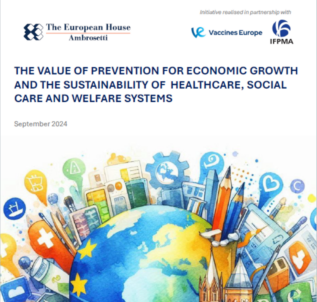Only an urgent shift towards prevention-based healthcare can secure economic stability for EU health systems, experts say
As Governments of EU Member States present their medium-term fiscal structural plans on 20 September, a new report developed by The European House – Ambrosetti, supported by IFPMA and Vaccines Europe, notes that embedding preventative healthcare – in particular immunisation – into EU Member States’ fiscal policies is paramount to ensure the economic sustainability of healthcare, social care, and welfare systems.
As Governments of EU Member States prepare to present medium-term fiscal structural plans for the next 4-7 years to the European Commission by 20th September, experts are calling for an urgent change of direction.
This critical window provides a unique opportunity to consider healthcare, and in particular prevention, as an investment for social security according to the requirements of the New Economic Governance Framework (NEGF), a move echoing what has been done for defence and the green and digital transitions.
Embedding preventative healthcare such as immunisation – into EU Member States’ fiscal policies is paramount to ensure the economic sustainability of healthcare, social care, and welfare systems, a new report by The European House – Ambrosetti finds, supported by IFPMA and Vaccines Europe.
Preventative healthcare not only translates into increased life expectancy and improved quality of life, but also yields economic advantages, such as savings in healthcare spending and increased worker productivity, thereby supporting the country’s economic and social growth and resilience.
Quotes from contributors
“In a context marked by an aging population and slow economic growth, the value of prevention is immeasurable” – said Prof. Walter Ricciardi, Chair of the Mission Board on Vaccination in Europe and President of the European Commission’s Mission Board on Cancer, adviser of this initiative. “As European healthcare systems face increasing pressure from the growing number of elderly individuals and rising demand for medical services, preventative measures, among others immunisation, can help mitigate these challenges. By reducing the prevalence of diseases and avoiding costly treatments, prevention plays a crucial role in maintaining the long-term sustainability of healthcare, social care, and welfare systems”.
“In a scenario of tighter budget constraints, the reform of the EU fiscal rules, marked by the launch of the New Economic Governance Framework (NEGF), offers Member States an opportunity to increase investments in preventive healthcare,” said Prof. Massimo Bordignon, Member of the European Fiscal Board and adviser of this initiative. “Under the new rules, investment (‘growth-enhancing expenditure’) is now implicitly defined in economic terms, meaning it involves costs today but may reduce future expenses and promote future growth. Investing in prevention, particularly in immunisation, aligns well with this definition, as it not only boosts productivity through a healthier population but also reduces future spending by lowering the overall health needs of the population.”
“It is imperative to recognise that the current permacrisis needs to be addressed and overcome with concrete solutions. In this context, embedding preventive healthcare – and in particular immunisation – into EU Member States’ fiscal strategies is paramount to promote the economic sustainability of healthcare, social care, and welfare systems. Member States must seize this moment to advocate for and implement this opportunity within their fiscal structural plans”, – said Elisa Milani, Senior Consultant, Healthcare Area, The European House – Ambrosetti.
“Today’s report is yet another reminder that immunisation must be a cornerstone of health prevention programs, improving overall health and lifespan – as well as delivering real economic benefits to countries across the globe. It also supports recent research that demonstrates adult immunisation programs return up to 19 times their initial investment, once again showing that we must consider investment in vaccines as central to a more preventative approach to health” said Laetitia Bigger, Director, Vaccines Policy, IFPMA.
“We need a paradigm shift towards a prevention-based healthcare model. Despite the colossal return on investment that immunisation continues to demonstrate, in nearly 80% of EU Member States only 0.5% of healthcare budgets are dedicated to immunisation. Prevention, such as immunisation, must be at the heart of building more resilient and sustainable health systems, serving as a powerful tool that prevents sickness, saves lives, saves money and contributes to strong growth and strong communities”, said Sibilia Quilici, Executive Director Vaccines Europe.
About IFPMA
The International Federation of Pharmaceutical Manufacturers and Associations (IFPMA) represents over 90 innovative pharmaceutical companies and associations around the world. Our industry’s almost three million employees discover, develop, and deliver medicines and vaccines that advance global health. Based in Geneva, IFPMA has official relations with the United Nations and contributes industry expertise to help the global health community improve the lives of people everywhere. For more information, visit ifpma.org.
Learn more





